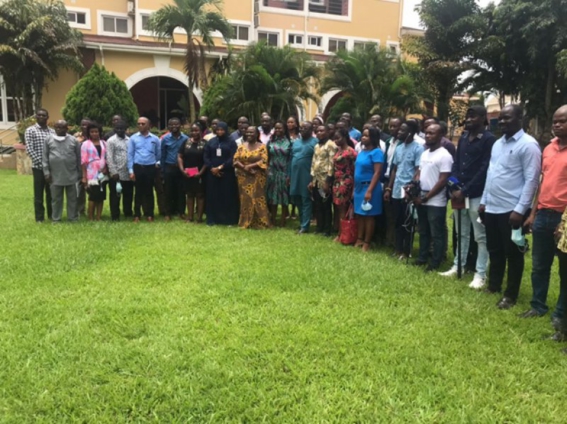About 30,000 household toilet facilities are expected to be provided for people in low-income communities in the Greater Kumasi Metropolitan Area (GKMA).
Additionally, a total of 5,000 households will be supported to connect potable water into their homes, under the Greater Kumasi Sanitation and Water Project.
This is to help ensure increased access to improved toilet and water facilities to the majority of poor and vulnerable people in urban and peri-urban communities.
Minister for Sanitation and Water Resources, Cecilia Abena Dapaah said this at a day’s orientation workshop on the Greater Kumasi Sanitation and Water Project for some media personnel in Kumasi.
The workshop was aimed at introducing the project which was launched in November last year to the media in the Ashanti region.
The project, according to the Minister, has four components which were mainly to increase access to sanitation services to people in low-income and deprived areas.
It would also help to support the expansion of the water distribution networks in GKMA to provide water for an estimated 150,000 people.
Again it would strengthen institutions and provide technical assistance to stakeholders in the water and sanitation sector.
The project beneficiaries are the eight Metropolitan and Municipal assemblies in the GKMA, which include the Kumasi Metropolitan Assembly (KMA), Asokwa, Oforikrom, old Tafo, Suame, Kwadaso, and the Asokore Mampong Municipal Assemblies.
Madam Dapaah said the facilities would be maintained and expanded as the population in those areas increased.
The Minister pointed out that the water supply in Kumasi was not good, saying the Owabi headworks in the Atwima Nwabiaqya District would soon be dredged.
The government she said was providing pragmatic measures to find a lasting solution to the water and sanitation problems in Kumasi.
Madam Dapaah called on the media to take an active part in making sure that the agenda of making the country clean was achieved,
The Project Coordinator, Mr George Asiedu said a steering committee had been established to ensure the sustainability of the project to provide a safe sewage system.
Engineer for the project, Kwadwo Gyasi pledged to work to provide sustainable clean, and hygienic toilet facilities for the people.
He said it was Bio-digester technology that degrades faecal matter into smaller particles,
Mr Gyasi called on the media to educate the public on improved water and sanitation practices.
Latest Stories
-
Parents of East Legon accident teen fined GH₵12,000 for negligence
4 minutes -
GMA condemns attacks on official bungalow of Ashanti Regional Chairman
14 minutes -
Paul Pogba’s brother sentenced to a year in prison for extortion
14 minutes -
Gospel artiste Frank Owusu wraps up 2024 with new single, worship event
17 minutes -
GPL 2024/25: Hearts seek redemption in Berekum Chelsea contest after Kotoko defeat
27 minutes -
Karpowership Ghana spreads Christmas cheer to children at Echoing Hills Village
34 minutes -
‘Together, we rebuild’ – UG NDC Lecturers Caucus calls for national unity in tackling Ghana’s challenges
40 minutes -
Mahama’s victory a triumph for transformative leadership in education – UG NDC Lecturers Caucus
45 minutes -
Full text: Electoral Commission update on outstanding results of 9 constituencies
46 minutes -
Our staff were under threat to make some declarations – Electoral Commission
50 minutes -
Ablekuma North and Okaikwei Central collation will not be accepted – EC
1 hour -
MGL’s Doreen Avio and Hannah Odame earn master’s degrees from UPSA
2 hours -
ORAL is not a tool for witch-hunting – John Mahama
2 hours -
Audit the state of Ghana’s health sector – Kwame Asiedu urges Mahama
2 hours -
East Legon accident: Salifu Amoako’s son jailed 6 months
2 hours

